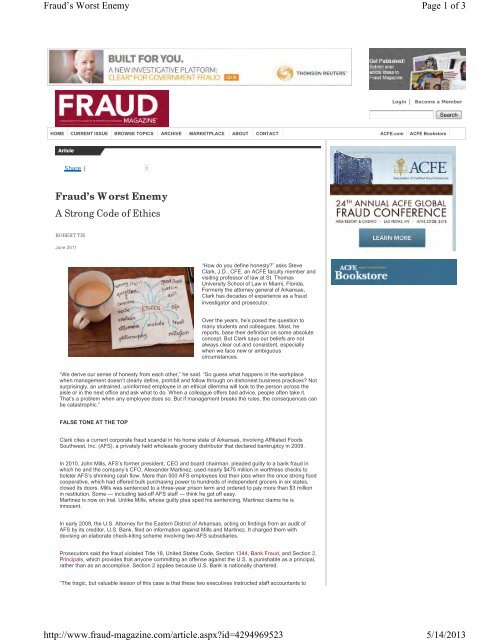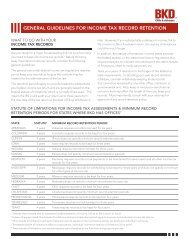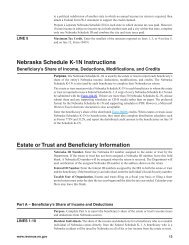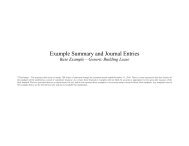Fraud’s Worst Enemyhttp://www.<strong>fraud</strong>-magazine.com/article.aspx?id=4294969523Page 1 of 35/14/2013Login | Become a MemberSearchHOME CURRENT ISSUE BROWSE TOPICS ARCHIVE MARKETPLACE ABOUT CONTACT ACFE.com ACFE BookstoreShare |0Fraud’s Worst EnemyA Strong Code of EthicsROBERT TIEJune 2011“How do you define honesty?” asks SteveClark, J.D., CFE, an ACFE faculty member andvisiting professor of law at St. ThomasUniversity School of Law in Miami, Florida.Formerly the attorney general of Arkansas,Clark has decades of experience as a <strong>fraud</strong>investigator and prosecutor.Over the years, he’s posed the question tomany students and colleagues. Most, hereports, base their definition on some absoluteconcept. But Clark says our beliefs are notalways clear cut and consistent, especiallywhen we face new or ambiguouscircumstances.“We derive our sense of honesty from each other,” he said. “So guess what happens in the workplacewhen management doesn’t clearly define, prohibit and follow through on dishonest business practices? Notsurprisingly, an untrained, uninformed employee in an ethical dilemma will look to the person across theaisle or in the next office and ask what to do. When a colleague offers bad advice, people often take it.That’s a problem when any employee does so. But if management breaks the rules, the consequences canbe catastrophic.”FALSE TONE AT THE TOPClark cites a current corporate <strong>fraud</strong> scandal in his home state of Arkansas, involving Affiliated FoodsSouthwest, Inc. (AFS), a privately held wholesale grocery distributor that declared bankr<strong>up</strong>tcy in 2009.In 2010, John Mills, AFS’s former president, CEO and board chairman, pleaded guilty to a bank <strong>fraud</strong> inwhich he and the company’s CFO, Alexander Martinez, used nearly $475 million in worthless <strong>check</strong>s tobolster AFS’s shrinking cash flow. More than 500 AFS employees lost their jobs when the once strong foodcooperative, which had offered bulk purchasing power to hundreds of independent grocers in six states,closed its doors. Mills was sentenced to a three-year prison term and ordered to pay more than $3 millionin restitution. Some — including laid-off AFS staff — think he got off easy.Martinez is now on trial. Unlike Mills, whose guilty plea sped his sentencing, Martinez claims he isinnocent.In early 2009, the U.S. Attorney for the Eastern District of Arkansas, acting on findings from an audit ofAFS by its creditor, U.S. Bank, filed an information against Mills and Martinez. It charged them withdevising an elaborate <strong>check</strong>-kiting scheme involving two AFS subsidiaries.Prosecutors said the <strong>fraud</strong> violated Title 18, United States Code, Section 1344, Bank Fraud, and Section 2,Principals, which provides that anyone committing an offense against the U.S. is punishable as a principal,rather than as an accomplice. Section 2 applies because U.S. Bank is nationally chartered.“The tragic, but valuable lesson of this case is that these two executives instructed staff accountants to
Fraud’s Worst Enemyhttp://www.<strong>fraud</strong>-magazine.com/article.aspx?id=4294969523Page 2 of 35/14/2013perform <strong>fraud</strong>ulent transactions that facilitated and concealed the scheme,” Clark said. “Mills and Martinezprovided the worst example possible for those looking to them for ethical leadership.”At his plea hearing, Mills explained how the <strong>check</strong>-kiting scheme worked. Each business day, an AFSaccountant would calculate the company’s cash-flow shortfall by subtracting the company’s anticipatedclearing items from its expected deposit items. AFS’s accountant then would “order” from two AFSsubsidiaries <strong>check</strong>s drawn on their virtually empty accounts and payable to AFS, which then deposited the<strong>check</strong>s. After they cleared, AFS paid down its tab at U.S. Bank, and used its refreshed credit to s<strong>up</strong>ply thesubsidiaries with funds to cover the <strong>check</strong>s they had provided to AFS.“The AFS board was asleep at the wheel,” Clark said. “They didn’t notice that the positive cash flow wasphony, and no one who might have known felt empowered to tell them. If the tone at the top had beendifferent, there would have been effective ethics policies, procedures and a reporting mechanism.Someone might have spoken <strong>up</strong>. But ethics and due diligence weren’t priorities for AFS, and the <strong>fraud</strong>sterstook advantage.”THE RIGHT WAY TO DO ITLiving only 20 miles south of Walmart headquarters in Bentonville, Ark., Clark is well-versed in the retailgiant’s business culture.“Purchasers for Walmart are like investigative journalists,” he said. “They won’t let you give them anything,not even a c<strong>up</strong> of coffee. So, when a vendor says, ‘Hey, I’ve done $3 million worth of business with you.Here’s an opportunity that could give us a little something on the side,’ they throw him out. Why is thatoutcome so certain? Because Walmart leadership has communicated it, reiterated it and enforced it.There’s no doubt in employees’ minds about what’s wrong, what the penalties are and whethermanagement will back them <strong>up</strong> if they report a breach. It’s the right way — the smart way — to run abusiness.”In addition to recommending that CFEs compare their employer’s and clients’ codes of ethics withWalmart’s, Clark cites three best practices of companies that know how to make ethical profits and fend off<strong>fraud</strong>sters:1. Design and enforce a comprehensive <strong>fraud</strong> <strong>prevention</strong> policy and code of ethics. Ensure that everyemployee attends refresher training annually to stay abreast of new risks in a constantly changing businessenvironment. Establish and publicize confidential reporting mechanisms.2. Obtain unequivocal, ongoing C-suite and middle management s<strong>up</strong>port for the anti-<strong>fraud</strong> regime andethics program.3. When abuse or neglect is certain, fully enforce the ethics code and anti-<strong>fraud</strong> policies and procedures,regardless of the offender’s rank. Likewise, investigate allegations promptly and thoroughly, following <strong>up</strong>with enforcement when suspicions prove true. Bear in mind that the significance of minor offenses may bemore symbolic than substantive. In such cases, when termination is inappropriate, alternatives such astemporary demotion or closer s<strong>up</strong>ervision can demonstrate management’s commitment to enforcementwithout depriving the organization of an otherwise valuable employee.LEGAL AVENUESClark said state or federal prosecutors primarily want to know whether you can document any loss yourclient or employer alleges. Time- and resource-strapped state prosecutors will not be interested unlessdamages have reached at least six figures, and many U.S. attorneys do not have enough time to work oncases involving less than $1 million in damages, he said.Also, prosecutors infrequently try <strong>fraud</strong> cases, Clark said. “So you, the CFE, have to explain yourinvestigative strategy and demonstrate its thoroughness,” he said. “I therefore strongly recommend thatyou develop a relationship with a CPA or auditor to deal with financial issues. And have a lawyer you cancall in when necessary.”Clark said working with a lawyer will protect communications with your client under the confidentiality of theattorney-client privilege. An attorney also will ensure you don’t violate a suspect’s legal rights, obtaininadmissible evidence or violate the provisions of any contract between your client and an employee you’reinvestigating, he said.Establish a relationship with your employer or client’s human resources department, he adds, so you’llhave access to employee records, which can be invaluable in an investigation.Finally, Clark recommended presenting evidence to prosecutors concisely.“Keep it simple,” he said. “A picture is worth a thousand words, but a thousand pictures are worth nothing.”Robert Tie is a New York business writer.The Association of Certified Fraud Examiners assumes sole copyright of any article published onwww.<strong>fraud</strong>-magazine.com or www.ACFE.com. ACFE follows a policy of exclusive publication. Permissionof the publisher is required before an article can be copied or reproduced. Requests for reprinting an articlein any form must be emailed to: FraudMagazine@ACFE.com.
- Page 1 and 2:
ACFE FRAUD PREVENTIONCHECK-UP
- Page 3 and 4:
ACFE FRAUD PREVENTIONCHECK-UPThe Be
- Page 5 and 6:
ACFE FRAUD PREVENTIONCHECK-UPACFE F
- Page 7 and 8:
ACFE FRAUD PREVENTIONCHECK-UPACFE F
- Page 9 and 10:
ACFE FRAUD PREVENTIONCHECK-UPACFE F
- Page 11 and 12:
ACFE FRAUD PREVENTIONCHECK-UPACFE F
- Page 13 and 14:
Sponsored by:The Institute of Inter
- Page 15 and 16:
Team Members:Toby J.F. Bishop, CPA,
- Page 17 and 18:
Managing the Business Risk of Fraud
- Page 19 and 20:
establish their own fraud risk mana
- Page 21 and 22:
Fraud risk identification may inclu
- Page 23 and 24:
Thus, to properly address fraud ris
- Page 25 and 26:
The board also has the responsibili
- Page 27 and 28:
• Implementing adequate internal
- Page 29 and 30:
Fraud Risk Management Program Compo
- Page 31 and 32:
ecently been hired in the purchasin
- Page 33 and 34:
Organizations can identify and asse
- Page 35 and 36:
The Risk Assessment TeamA good risk
- Page 37 and 38:
This also involves understanding th
- Page 39 and 40:
- Invoices for goods not received o
- Page 41 and 42:
Other RisksRegulatory and Legal Mis
- Page 43 and 44:
SECTION 3: FRAUD PREVENTIONPrincipl
- Page 45 and 46:
An organization’s HR group is oft
- Page 47 and 48:
SECTION 4: FRAUD DETECTIONPrinciple
- Page 49 and 50:
Process ControlsProcess controls sp
- Page 51 and 52:
keep such information confidential.
- Page 53 and 54:
will vary depending on the nature,
- Page 55 and 56:
Conducting the InvestigationPlannin
- Page 57 and 58:
• Extended investigation — Cond
- Page 59 and 60:
Fraud ControlsDeloitte Forensic Cen
- Page 61 and 62:
APPENDIX B: SAMPLE FRAMEWORK FOR A
- Page 63 and 64:
APPENDIX C: SAMPLE FRAUD POLICY 41N
- Page 65 and 66:
CONFIDENTIALITYThe ______________ U
- Page 67 and 68:
Sample Fraud Policy Decision Matrix
- Page 69 and 70:
Identified Fraud Risksand Schemes (
- Page 71 and 72: 2) Misappropriation of:a) Tangible
- Page 73 and 74: ) Embezzlement(1) False accounting
- Page 75 and 76: Fraud Prevention Area, Factor, or C
- Page 77 and 78: Fraud Prevention Area, Factor, or C
- Page 79 and 80: Fraud Prevention Area, Factor, or C
- Page 81 and 82: Fraud Prevention Area, Factor, or C
- Page 83 and 84: O-Organization / PersonnelO1-Leader
- Page 85 and 86: O4.3 Enhance Operational Skills & C
- Page 87 and 88: PR-Prevent, Protect & PreparePR1-Ge
- Page 89 and 90: E-Periodic EvaluationE1-Evaluation
- Page 91 and 92: I2-CommunicationI2.1 Develop Commun
- Page 93 and 94: CriminologyFraud Prevention Program
- Page 95 and 96: CriminologyFraud Prevention Program
- Page 97 and 98: CriminologyFraud Prevention Program
- Page 99 and 100: CriminologyFraud Prevention Program
- Page 101 and 102: CriminologyFraud Prevention Program
- Page 103 and 104: CriminologyFraud Prevention Program
- Page 105 and 106: CriminologyFraud Prevention Program
- Page 107 and 108: CriminologyFraud Prevention Program
- Page 109 and 110: CriminologyFraud Prevention Program
- Page 111 and 112: CriminologyFraud Prevention Program
- Page 113 and 114: CriminologyFraud Prevention Program
- Page 115 and 116: CriminologyFraud Prevention Program
- Page 117 and 118: Sample Fraud PolicyAssociation of C
- Page 119 and 120: Sample Fraud PolicyCONFIDENTIALITYT
- Page 121: Sample Fraud PolicyFraud Policy Dec
- Page 125 and 126: ACFE Insights - ACFE Insightshttp:/
- Page 127: ACFE Insights - ACFE Insightshttp:/









